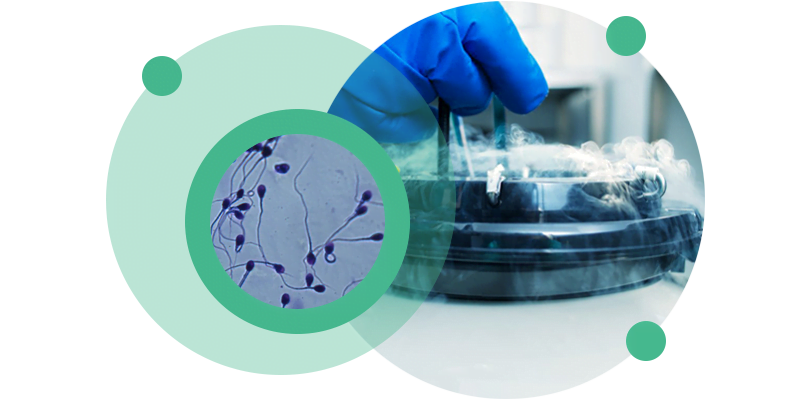Sperm Cryopreservation
Sperm cryopreservation is a way of preserving male fertility.
This technique can be used in situations involving oncological or non-oncological diseases that may affect future fertility. It can also be useful in the case of patients undergoing medically assisted reproduction treatments but who will need to be absent or in cases where it is difficult to obtain an ejaculate collection.
Once a sample of ejaculate has been collected, it is observed and processed in the laboratory. The sample obtained is cryopreserved in straws and stored for later use.

About Sperm Cryopreservation
Sperm cells are produced continuously in the testicles from puberty onwards. These cells reach the outside of the male reproductive system, along with the seminal fluid, through ejaculation. These cells survive for a few hours outside the body. However, sperm cryopreservation allows these cells to be preserved for future use.
To carry out this procedure, cryoprotective agents are used to protect the spermatozoa and enable them to withstand the low temperatures to which they will be subjected.
Sperm cryopreservation is indicated in a number of situations, including
- Patients with oncological diseases whose treatment may affect fertility
- Patients with non-oncological conditions or who are due to undergo surgery that may affect future fertility
- Patients who will undergo vasectomy but wish to preserve their fertility
- Patients in the MAP cycle who will be absent on the day ejaculate collection is required
- Patients in the MAP cycle who have difficulty collecting ejaculate at a specific day and time
- Patients with low sperm concentration in the ejaculate or microdeletions on the Y chromosome
- Patients with no associated pathology but wishing to preserve gametes for future use
Before the sperm cryopreservation procedure, blood tests must be carried out to screen for viral infections. You will also need to sign a specific informed consent form for sperm cryopreservation.
The sperm cryopreservation procedure must be scheduled. On the day of the appointment, you must collect the ejaculate by masturbation. The ejaculate can be collected on the clinic’s premises or at home and delivered to the clinic by the patient. In general, 2 to 3 days of sexual abstinence are recommended before the procedure.
The collection of ejaculate is observed and processed in the laboratory. Specific methods are used to cryopreserve the spermatozoa, using cryoprotective agents to protect them from the extremely low temperatures to which they will be subjected. The treated sample is cryopreserved in devices called straws, which will be stored in liquid nitrogen containers (-196 o C). Each reed can be used for one cycle of Medically Assisted Reproduction treatment.





Common questions
After observing and processing the sample, the laboratory team determines how many straws will be cryopreserved from this sample, in order to increase the chances of success of a future MAP treatment.
Based on the results of cryopreservation, it may be suggested that several samples be taken for cryopreservation.
Under current Portuguese law, sperm can remain cryopreserved for a period of 5 years, after which the patient must sign a new consent form to maintain cryopreservation for a further 5 years.
If you do not wish to use your cryopreserved sperm, you can consent to their donation to other recipients of Medically Assisted Reproduction treatments or to their donation to scientific research projects. If you do not consent to either of these, the sperm will be thawed and disposed of.
It is likely that some sperm cells will not survive the cryopreservation and thawing process. The loss of these cells is all the more negligible the better the quality of the sample.
Cryopreserved sperm samples can be used in cycles of intrauterine insemination, in vitro fertilisation (IVF) or intracytoplasmic sperm microinjection (ICSI) depending on the quality of the sample and the couple’s clinical assessment.
None of the MAP treatments can guarantee pregnancy, but the success of MAP techniques is similar whether fresh or cryopreserved sperm is used.
You can consult the CETI price list here.
